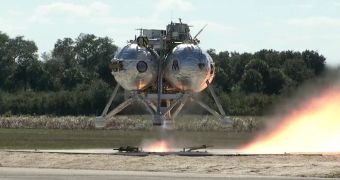Officials at the NASA Johnson Space Center (JSC) in Houston, Texas, announced yesterday, February 11, that the Morpheus test lander has just completed its seventh successful, untethered flight. The spacecraft is being developed by JSC engineers to feature vertical takeoff and landing capabilities.
The latest test flight took place on Monday, February 10, at the NASA Kennedy Space Center (KSC) in Florida. The Morpheus spacecraft is powered by a series of rocket engines, which enable it to rise from the ground freely, and hover above the Earth's surface.
On Monday, the lander was able to take off successfully using nothing more than its internal rockets, rose to an altitude of 142 meters (466 feet), and moved 194 meters (636 feet) laterally before landing on the exact target spot mission controllers intended.
Morpheus thus simulated a launch from the surface of another planet, and flying over an area featuring impassible terrain. Such situations are very likely to occur on other worlds, if planetary scientists ever want to explore areas outside of flat plains or crater floors.
The spacecraft used on February 10 is called Bravo, and is the second Morpheus-class spacecraft to be constructed by JSC engineers. The first one, called the Alpha Vehicle, was destroyed during the first untethered flight in the program, in August 2012. Bravo carried out all other flights flawlessly.
Vertical takeoff and landing (VTOL) spacecraft like Morpheus can help experts test the type of guidance and navigation systems that will be needed for charting and exploring the surfaces of other planets as humans extend their dominion in space.
While NASA and companies such as Masten Space Systems plan to create fully-autonomous, unmanned VTOL spacecraft, the Blue Origins corporation is developing the New Shepherd VTOL capsule, which it plans to use to send astronauts into space, or on suborbital spaceflights.
Blue Origins is funded by Jeff Bezos, the founder of Amazon. The company is notorious for keeping mum on its designs and progress, only releasing small amounts of media materials from time to time, Space News reports.

 14 DAY TRIAL //
14 DAY TRIAL //